Compactness and ease of use. Features of a hand pump for pressure testing of a heating system
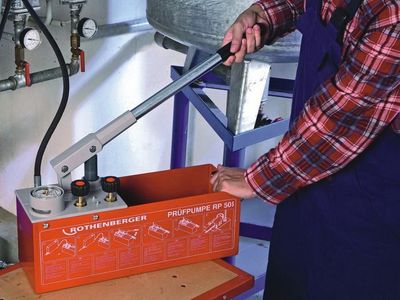
Pressure testing is a parallel testing procedure on the strength and tightness of the heating system by creating high pressure.
The first pressure test is carried out immediately after the pipeline is installed on the siteThis is done to identify potential leak locations.
Mechanical pumps are most often used for domestic purposes. Such units are cheaper, they are compact, and easy to operate. Their special feature is in ease of use and the ability to work in confined spaces without access to the electrical grid.
Pumps for pressure testing and filling the system: are there any differences
Pressure testing pumps and filling equipment do not have significant differences. Often the same unit is used both to test the strength of the system and to fill it.
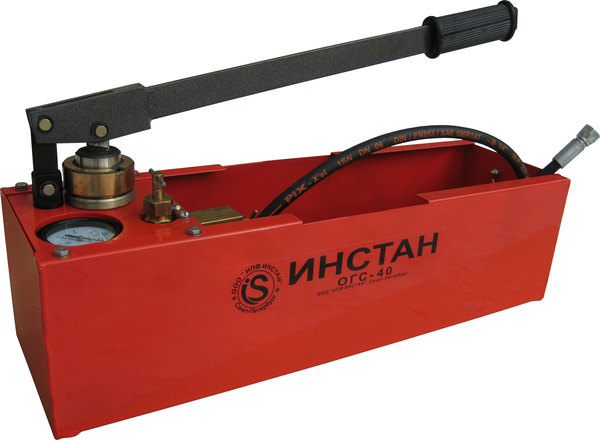
Photo 1. This is what a hand pump for pressure testing looks like. The manufacturer of the device is NPF Instan.
Modern pressure testers and injection pumps differ in the type of drive. It can be electric or manual. By the principle of operation The equipment is divided into the following types:
- membrane;
- vane-rotor;
- piston.
The principle of operation of the pressure tester
The operating principle of a manual pressure tester is quite simple. Water is poured into the heating system to be tested to the maximum possible level. After that, by pressing the lever, the pressure level required for testing is achieved (2-3 times higher than the working norm). When the required pressure value is obtained, the unit's ball valve is closed. The operator monitors the fluctuations on the pressure gauge.
Attention! To prevent excessively high pressure inside the heating system during the pressure testing process, the pumps are equipped with with a special bypass valve.
If the pressure starts to drop, then the pipe is leaking. The described the procedure is repeated several times. If a defect is detected, work is stopped until it is corrected.
The first pressure test is carried out immediately after the completion of installation work. Then the test is repeated. every 5 years after flushing the pipeline aggressive chemicals.
Advantages of manual pressure testing pumps
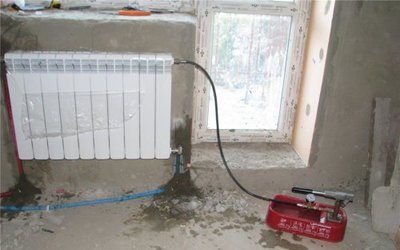
Mechanical crimping unit has a number of advantages:
- Low weight and compact dimensions
The low weight and compactness of the equipment allow for easy handling and transportation of the devices without the use of lifting devices.
The units can be used even in limited spaces.
- High accuracy of the results obtained
The accuracy rate largely depends on the power of the device itself. When choosing a specific model of equipment, you need to understand that using a low-power pump increases the time required for testing. In addition, if a leaky joint is detected, the test results may be distorted.
- Autonomy of work
Unlike electrically powered models, manual crimpers are suitable for use away from a power source.
- Ease of use
Hand-held devices have a simple design and do not require maintenance by qualified specialists.
Disadvantages of devices
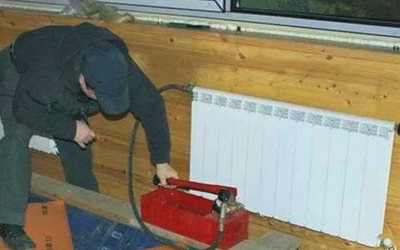
Disadvantages for mechanical pressure testing pumps just two:
- low productivity;
- the need for the owner of the unit to take direct part in the pressure testing.
Because of these disadvantages, manual pressure testers not used on large objects. Most often they are used in private country houses and cottages.
Useful video
Watch a video review of a manual pressure tester for heating systems, which explains the operating principles of the device.
Selecting a pumping device for heating supply and pressure testing
When choosing a specific model of a pressure tester take into account the parameters of the heating system, in which it will be further exploited.
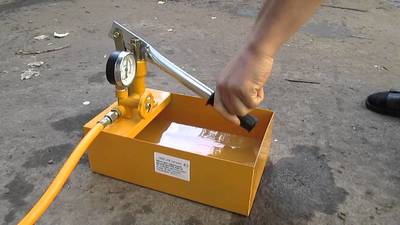
It is recommended to choose more durable modifications. with a steel body, not a plastic one.
A good manual crimper has convenient lever for pumping liquid And two safety valves.
It is also worth paying attention to the quality of the hose through which the device is connected. It is better to choose reinforced version, characterized by relative flexibility.
After connecting the device physical effort will be required: Using a lever, increase the pressure in the heating system, close the valve and carefully monitor the pressure gauge.






Comments